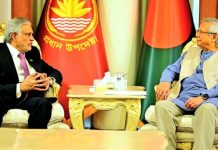ISLAMABAD, NOV 22: A coalition of six opposition parties, under the banner of Tehreek Tahafuz Ayeen-i-Pakistan (TTAP), on Saturday demanded an investigation into alleged economic irregularities highlighted in a recent International Monetary Fund’s (IMF) report
Addressing a press conference along with Pakistan Tehreek-e-Insaf (PTI) leader Taimur Khan Jhagra, former Sindh governor criticised the incumbent government for failing to issue any clarification more than 48 hours after the IMF’s report surfaced.
“The government representatives had not denied or responded to the IMF’s findings despite repeated calls,” he said, questioning why the administration “kept the IMF report hidden for three months” when, according to him, “the IMF had made the release of the report a condition for receiving the next tranche.”
The IMF, in its long-awaited Governance and Corruption Diagnostic Assessment (GCDA), warned that persistent corruption and weak institutions continue to undermine the country’s economic development even as it stabilises under an Extended Fund Facility (EFF).
The report, publication of which is a precondition for the IMF executive board’s approval of a $1.2 billion disbursement next month, estimated that Pakistan could boost economic growth by about 5% to 6.5% over five years if it implements a package of governance reforms beginning within the next three to six months.
The GCDA seeks an end to special treatment for a few influential public sector entities in direct government contracts.
It also recommends tighter limits on the government’s financial powers without greater parliamentary oversight and streamlining of anti-corruption agencies. The government had been delaying the publication of the report since August.
Speaking to journalists today, Zubair — who left the Pakistan Muslim League-Nawaz (PML-N) — said the opposition was formally seeking a probe into the “irregularities documented in the report”, adding that the public was already suffering under the burden of inflation.
Zubair also reiterated his criticism of cases lodged against the PTI founder Imran Khan, terming them “false, fabricated and baseless”.
For his part, Jhagra said the IMF had explicitly raised concerns about corruption and political interference in Pakistan’s institutions.
“The IMF is saying there is corruption in Pakistan,” he remarked. “It [IMF] says institutional performance comes under political pressure.” He added that investors were hesitant because “judicial institutions are perceived as corrupt” and that such an environment discouraged investment.
Jhagra said the report, dated November 2025, pointed out that Pakistan’s “transfer culture” functioned as a form of punishment within the system. He emphasised that accountability for all was essential, noting that “no one in the world enjoys lifelong immunity.”
He further noted that the IMF did not directly comment on the SIFC but consistently demanded transparency in the country’s governance mechanisms.
“In such conditions, no investor will come to Pakistan,” he said, adding that the country needed a transparent system and broad accountability to restore trust.

















